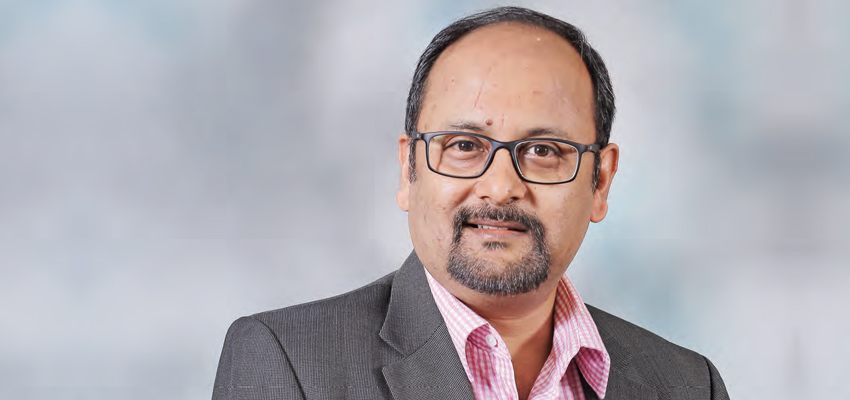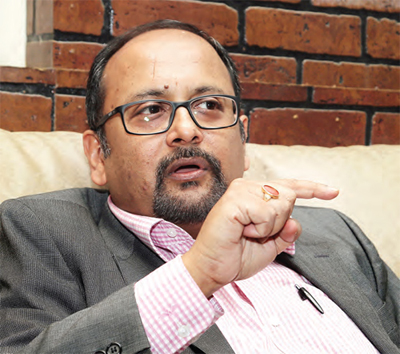Embrace Change to Move Forward

An alumnus of IIM Ahmedabad and the National Institute of Personnel Management, Sandeep Banerjee, started his career with the Swedish MNC, ESAB India in 1994. In 1996, he moved to Electrosteel Castings as their Personnel Manager and spent a good five years with the company. In 2005, Banerjee transitioned to the hospitality industry, shifting base from Kolkata to Mumbai. He spent a decade at Taj Hotels and held leadership responsibilities in HR as the Director - HR for 42 Hotels globally. In an interview with the Corporate Citizen, Sandeep Banerjee, President and Head HR, H&R Johnson (India) - a division of Prism Johnson Ltd, shares insights and learnings from 25 years of his career journey.
"Have a positive attitude and an adaptable mind-set. You may have a version of views about what things should look like, your own sets of ideas and pre-ideas, but if you are adaptable, have a flexible mindset, have a positive attitude, you will be a winner"
- Sandeep Banerjee
Corporate Citizen: Tell us about your education and career journey.
Sandeep Banerjee: I did my graduation in Economics (Hons.) from the University of Calcutta and after that, I did my post-graduation in Personnel Management and Industrial Relations from NIPM, Calcutta. I then did a programme in Strategic HR Management from IIM-Ahmedabad. My first job was in 1994 in a Swedish MNC firm, ESAB. That was the time when I started my corporate journey in HR and IR-at that time Human Resource was more Personnel Management and Industrial Relations (IR), and I was working in their factory. Post that, I joined Electrosteel Castings in 1996 – a company that was into manufacturing of Ductile Iron Steel Pipes. After about nearly nine years of experience in Factory HR set ups, I moved to a Dutch Pharma company in Kolkata. Thereafter, I moved to hospitality and joined the Taj Group of Hotels in 2005 and was there for nearly a decade as Head of HR for 42 Hotels globally. I moved on to Reliance Industries as Head of HR for their Corporate Functions before joining Prism Johnson Limited as the HR Head for H&R Johnson (India).
CC: The reason you chose HR?
From early days, I always had a flair for interacting with people, was confident speaking in public to a gathering and had the ability to solve issues which were people centric. I was very active in school and college sports, competitions and participated in most activities. I chose HR as the profession for me as I wanted to touch lives and contribute, and do my bit. I am happy that I chose this profession and have never regretted.
CC: What are the positive traits that you see in today’s youth?
I think today’s generation is very sharp and are focussed. The youth of today is very much grounded and they are confident about their goals. They are strong in intelligence and look forward to a life where they want to create their own identity-they are not just followers. They want to create something of their own; they have a sense of belonging. This characteristic makes them different and stands out. Today’s youth has got a lot of potential in them; their aim is not to just graduate, but explore further and keep learning. This is something that excites me about today’s youth and as a result, I learn more from them every day. That is something that keeps me on my toes and which in turn, facilitates my learning.
CC: What is the difference that you witness between today’s generation and the earlier generation?
The youth of today has so many qualities as I shared earlier. They need to channelise their energy for creative development of self and of the nation at large. They are in a hurry today and wants to achieve success at a fast pace in the shortest possible time. This makes them impatient and results in leaving jobs frequently. Also, we have seen that there are multiple distracting factors they need to overcome by keeping their calm and not moving away from the goal and the focus. Today’s youth defies the status quo a lot more than what the youth of yesterday used to do. As mentors or as seniors, our role is to channelise the energy of the youth to something creative, positive and something that is beneficial for self and the organisation and the nation at large. In our times, we did not have such an ambit of avenues to look forward, as there is today. In a nutshell, a positive youth today can do wonders.
CC: What sort of future work trends can be observed?
The current era that we are living in is of Artificial Intelligence (AI), Machine Learning (ML), BOTS and of Analytics. That being said, one must not give up the thinking hat, the innovation should not stop. One should always ask questions; however stupid it may seem. Interaction is essential. The human connect will always remain and it will be more demanding. While we get into Work-From-Home and Hybrid concepts of work, the human interaction factor of counselling, listening, empathising will be in demand and the HR fraternity will need to focus on this area more and more.
"While we get into Work-From-Home and Hybrid concepts of work, the human interaction factor of counselling, listening, empathising will be in demand and the HR fraternity will need to focus on this area more and more"

CC: Are the organisations geared up for the next generation, i.e. Generation Z?
Yes. Corporates expect a lot from Gen Z. Corporates are getting ready to adapt as per Gen Z, but they are not fully ready. Gen Z is also going to be a generation that is going to be different from millennials. Gen Z has a higher ask side, they might ask for a workplace which the organisation might not have thought of. For instance, they may like to work from home, they might want to work on their laptops in a Starbucks cafe, they may defy office cultures, and they may defy office timings. But, I think that is a balancing act. As corporates, we would have to give-in to a few of these demands, accept some as the order of the day and at the same time, Gen X should gear up because there is a larger audience in place. Organisations need to adapt themselves, so as to attract a larger workforce and talent pool.
CC: What is your take on the gig economy? Is it a short-term disruption?
Gig economy or Gig culture of short-term subject matter experts, short-term contracts, etc. - type of trends of working for a short-term will remain. If you see the outside world, everyone is on a contract, so that’s not something new that is happening. In India, we have been following a traditional system of working wherein, you get an appointment letter, work till 58 /60 years of age and you think that you can work for the next 30 years in the company. But, that order will slowly and definitely get eradicated. Companies will look for subject matter experts. The way I see it, there will be a few types of employees. The first type would be the pillars of an organisation, and you need to have pillars in an organisation. The second type of employees would be the baseline workers and they too have to stay. There is going to be a set of employees who provide a boost to the organisation in some way -you may need this type of people to shift the curve, move the needle, which in turn will prove to bring efficiency to the organisation. On the other hand, there will be a set of subject matter experts, which are present today also, but not many companies have that. Fixed-term employment for a certain period is going to be definitely the future. With Artificial Intelligence (AI), Machine Learning, Chatbox coming into the picture, the organisations will be fully equipped with a lot of analytics. The organisations will use the data to their benefit. While the generalist role will remain, I am not saying that it will be completely eradicate, however, subject matter experts, specialists etc. who will work on a contract basis, will keep increasing.
What the future employees should do is that, they should be on a continuous learning curve. What happened with Nokia can happen with an employee also. For instance, today, if I know SAP, it does not mean that I am employable. You need to reinvent and redo a lot of things as per the needs of your company, as per the needs of the work and as per the need for you to make yourself employable and sustain for long.
"The future employees should be on a continuous learning curve. They need to reinvent and redo a lot of things as per the needs of their company, as per the needs of the work and as per the need for you to make yourself employable and sustain for long"
CC: How HR in general is perceiving its employees in the Covid pandemic scenario as compared to the pre-Covid era? What has changed in terms of managing and enabling the employees? Is it difficult or easy for the HR Department to make sure that things are working out as they should when employees are working remotely?

We have seen the change in the world with the Covid Pandemic. While some sectors were already on a WFH mode as their work did not demand coming to office every day, it was not the case with traditional sectors as like ours. However, I personally think that the adaptation level was very fast and corporates were very quick to realise that this is going to be a reality for some time. In our company, we swung into action very soon and created the necessary guidelines about how we can work from home and yet be superbly productive.
Necessary infrastructure and technical support were provided to all employees. Google Meet and Zoom Calls became the new order of the day. Initially there was scepticism and a sense of insecurity. However proper communication was the key to eradicate all such issues. The HR teams led the initiative to engage employees, coordinate and ensure virtual training sessions, and ensure proper coordination between functions virtually. The HR teams ensured all employees and their families were safe and healthy. Large scale vaccination programmes were initiated. When we opened our plants and offices, we ensured huge amount of safety and precautionary measures and this was comforting to all employees and also to their families. We witnessed a sharp improvement in productivity levels during such challenging times.
The Covid situation has made us realise that some roles can be carried out remotely while other roles may need a hybrid way of working from office and remotely simultaneously. While there is no definitive answer what will be the shape of working in the future, we need to be flexible and adapt to the situation and ensure we enable business to grow and employee to be productive.
CC: How important is empathy in corporate culture today? In the backdrop of the current Covid situation?
We must keep human and economic metrics side by side, caring enough to place responsibility for long-term futures above short-term gains, and create space for people to be their whole selves. Thriving employees are twice as likely to work for an organization that effectively balances EQ and IQ in decision-making. This is empathy and it is needed for leading in an evolving world. While empathy existed earlier, the focus is more during these current times. A lot of these were happening in an informal way, where much was not talked about. The pandemic has simply made all of us conscious and vocal about it.
Over the last several months, the bonds between the management, employees and colleagues have strengthened. From just being there to help each other, they have all emerged stronger, not just as individuals but as an organisation. So as we move forward, being empathetic will determine how well connected a manager is with the employees at every level. Apart from the workplace needs, it will be more about the holistic wellbeing of the employees, which will ensure better performance and management.
So, by combining the left-brain understanding of commercial realities and their effects with the right-brain skills such as intuition and empathy to listen for and finding solutions, HR and business leaders can start to win with empathy.
CC: Any advice for the students?
The only single element that I tell students is to have a positive attitude and an adaptable mind-set. You may have a version of views about what things should look like, you may have your own sets of ideas and pre-ideas, but if you are adaptable, have a flexible mindset, have a positive attitude, you will be a winner. Perspiration is a must; there are no short cuts without hard work.